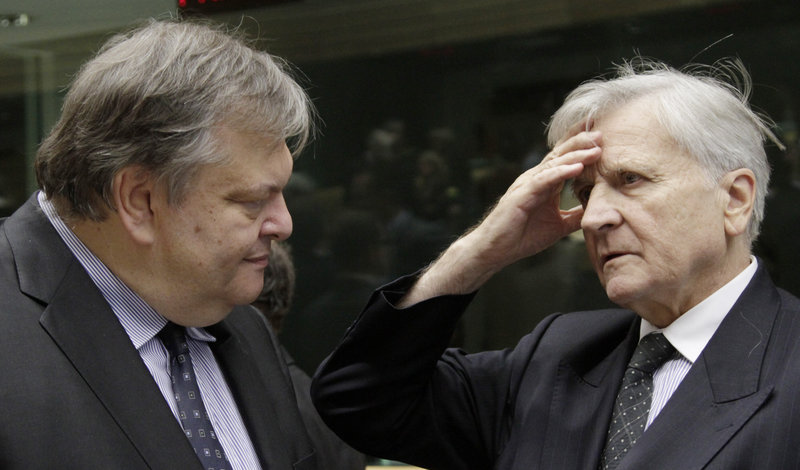BRUSSELS — Big banks found themselves under pressure in Europe’s debt crisis Saturday, with finance chiefs pushing them to raise billions of euros in capital and accept huge losses on Greek bonds they hold.
The continent’s biggest financial institutions were at the center of talks as leaders entered marathon negotiations in Brussels, at the end of which they have promised to present a comprehensive plan to take Europe out of its crippling debt crisis.
“Between now and Wednesday we have to find a solution, a structural solution, an ambitious solution and a definitive solution,” French President Nicolas Sarkozy said as he arrived in Brussels. “There’s no other choice.”
In addition to new financing for Greece, leaders want to make the banking sector fit to sustain worsening market turmoil and turn their bailout fund into a strong safety net that will stop big economies such as Italy and Spain from falling into the same debt trap that has already snapped Greece, Ireland and Portugal.
But before the final deadline Wednesday, they have to overcome many obstacles.
On Saturday, the finance ministers of the 27-country European Union decided to force the bloc’s biggest banks to substantially increase their capital buffers – an important move to ensure that they are strong enough to withstand the panic that a steep cut to Greece’s debt could trigger on financial markets.
A European official said the new capital rules would force banks to raise just over $140 billion, but finance ministers did not provide details on their decision. The official was speaking on condition of anonymity because it had been agreed to let leaders unveil the deal at their first summit Sunday.
“We have made real progress and have come to important decisions on strengthening European banks,” George Osborne, the U.K.’s chancellor of the exchequer, said as he left Saturday’s meeting.
The deal on banks was likely to be the only major breakthrough ready to announce today, leaving many important decisions and negotiations to be completed by Wednesday night.
On Friday, the first day of the marathon talks, the finance ministers of the 17 countries that use the euro – and which have found themselves at the center of the crisis because of the currency they share – agreed to demand Greece’s private creditors take big losses on their bondholdings.
But they still have to get the banks to come along and convince them that the cuts are the best way to ensure that Athens can eventually repay its remaining debts.
Copy the Story LinkSend questions/comments to the editors.



Success. Please wait for the page to reload. If the page does not reload within 5 seconds, please refresh the page.
Enter your email and password to access comments.
Hi, to comment on stories you must . This profile is in addition to your subscription and website login.
Already have a commenting profile? .
Invalid username/password.
Please check your email to confirm and complete your registration.
Only subscribers are eligible to post comments. Please subscribe or login first for digital access. Here’s why.
Use the form below to reset your password. When you've submitted your account email, we will send an email with a reset code.